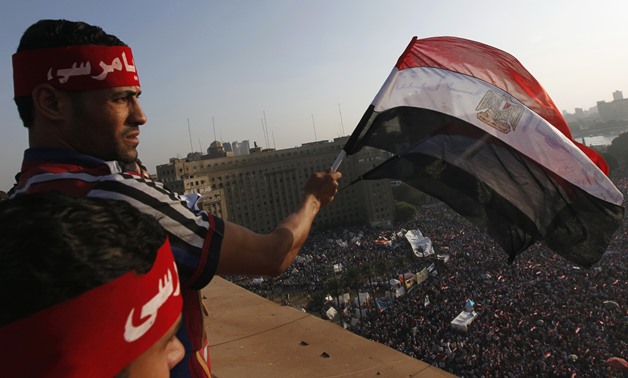
Protesters wave Egyptian flags as demonstrators opposing Egyptian President Mohamed Mursi shout slogans against him and Brotherhood members during a protest at Tahrir Square in Cairo June 30, 2013. REUTERS/Mohamed Abd El Ghany
CAIRO – 1 July 2018: Five years ago, Egyptian people gathered in Cairo’s Tahrir Square to overthrow Egypt’s Brotherhood President, Mohamed Morsi. Egypt Today presents possible scenarios for Egypt without June 30 Revolution.
Egypt would be threatened by a bloody civil war like Syria and Iraq
Egyptian social media users used the expression "Our situation is still better than the situation in Syria and Iraq” many times throughout their discussions to explain their opinion that life under hard economic conditions is still better than the fate that Egypt might have undergone if the Muslim Brotherhood continued to be in control of the country.
Muslim Brotherhood would not be banned or designated as a terrorist group
If there was no June 30 revolution, the Freedom and Justice Party of the Muslim Brotherhood would continue manipulating the political scene. Moreover, the Muslim Brotherhood group would carry out its terrorist attacks without being banned.
Turkey and Qatar would pretend to be allies to Egypt
The radical transformation in Turkey and Qatar's relations with Egypt after June 30 revolution and their absolute support for the Brotherhood's rule, seek to challenge the will of Egyptians who overthrew the Brotherhood-affiliated president. Turkish President Recep Tayyip Erdoğan turned from a friend to an enemy to Egypt, while Qatar supported the Muslim Brotherhood, and opened its doors for the Brotherhood's members. These moves are considered evidence of the two countries' disrespect for the Egyptians' will.
Sinai’s tunnels would open to smuggle gas, petrol and food from Arish to Gaza
The tunnels, that were used to transport or smuggle weapons between El Arish and Gaza Strip during the rule of the Muslim Brotherhood, are now used in huge successive and extensive military operations aimed at countering any attempt to smuggle weapons during the rule of President Abdel Fatah al-Sisi. Since June 30, the Egyptian army has destroyed nearly 1,700 tunnels between El Arish and Gaza.
Adly Mansour would not be known to most Egyptians
Though Mansour served as president of the Supreme Constitutional Court of Egypt, he was not known to the vast majority of citizens until he was appointed to serve as the interim president of the state after June 30 Revolution.
Tense relationship between civilians and the policemen
Since the outbreak of the revolution of January 25, 2011, the relationship between civilians and policemen has been tense because of the clashes that took place among the two sides on and after the Friday of anger. The revolution of June 30 came to put aside the differences between them; citizens started a new era with the police particularly after the police joined a number of demonstrations against the Brotherhood on June 30.
President Sisi addressed the Egyptian people on Saturday to commemorate the fifth anniversary of the June 30 Revolution, describing it as an “immortal day in Egypt’s history.”
“On this remarkable day, millions of Egyptians, men, women, elders and youth, stood up to say their word loud and clear: there is no place for a traitor or conspirator among them, and to stress that they have nothing but loyalty to their homeland,” Sisi said in a televised speech aired early Saturday, adding that the events of June 30 changed the whole region and redirected its destiny, otherwise it would have “sank into terrorism and sectarianism”.
“On this acclaimed day, Egyptians had stopped the extremism and division wave that would have plagued the region,” Sisi stressed, expressing his respect and appreciation to the people for their patience, persistence and unity with their national institution to confront one of the biggest challenges in their history.
The president pointed out to the lean years that have faced Egypt since 2011 until this day, saying that the country faced three challenges, each of them is enough to destroy an entire nation and displace its people, and they are: absence of security and political stability, the spread of terrorism and armed violence, and a collapsed economy.
“Every Egyptian should be proud of what she/he has achieved and of confronting those three challenges in no time; it is a miracle,” Sisi said.
The president reviewed what had been achieved since June 30, 2013, starting from stabilizing the pillars of the state and rebuilding its national institutions, like its constitution, executive and legislative authorities and judiciary.
Sisi lauded the role of the Armed Forces in eliminating terrorism and chasing it wherever it goes, backed by wide popular support; no matter the international support and fund terrorist groups receive.
Egypt celebrated on Saturday the fifth anniversary of the June 30 Revolution that toppled the banned Muslim Brotherhood-affiliated President Morsi after one year in power during which the country suffered fierce political conflicts and social split threatening the future of the nation.
To commemorate the fifth anniversary of the June 30 Revolution, the Egyptian Cabinet, headed by newly-appointed Premier Mostafa Madbouli, announced July 1 a national holiday to both the public and private sectors across the country.


Comments
Leave a Comment